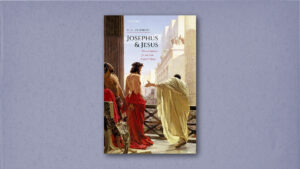These excerpts are taken from A Christian’s Pocket Guide to Loving the Old Testament by Alec Motyer (Christian Focus, 2015).
It’s not every day that the The Gospel Coalition’s co-founders, Tim Keller and Don Carson, take the opportunity to offer a foreword and afterword for a slim, easily overlooked book on “loving the Old Testament.” While many today rightly esteem and look up to Keller and Carson for their biblical insight, ministry experience, and proven faithfulness, do you ever wonder whom these men look up to?

Alec Motyer, that’s who. The 90-year-old former principal of Trinity College in Bristol, England has served as both a pastor and a professor. Although much of his academic life has been devoted to the study of the Old Testament, particularly Isaiah, Motyer has aimed to bring his insights to the layperson through lecturing and writing, most notably serving as co-editor with John Stott of the The Bible Speaks Today series.
Despite being a world-class scholar, Motyer views himself as “just a man who loves the Word of God.” Occasioned by the publication of A Christian’s Pocket Guide to Loving the Old Testament: One Book, One God, One Story (Christian Focus, 2015), the excerpts below pay tribute to a man who, now entering his tenth decade of life, continues to love the Word of God and the God of the Word. If anything, perhaps reading this will stimulate you toward greater Christlikeness, greater desire for Scripture, and greater ambition to finish well.
Tim Keller (“Foreword”):
Approximately 40 years ago, during the summer between my undergraduate college years and seminary, I was working and living with my parents in Johnstown, Pennsylvania. One evening I drove over the mountains down into a long valley in the midst of the Laurel Highlands and came eventually to the Ligonier Valley Study Center, just outside the little Western Pennsylvania hamlet of Stahlstown, where R. C. Sproul was hosting at his regular weekly Question and Answer session a British Old Testament scholar, J. Alec Motyer. As a still fairly new Christian, I found the Old Testament to be a confusing and off-putting part of the Bible.
I will always remember his answer to a question about the relationship of Old Testament Israel to the church (I can’t remember if R. C. posed it to him or someone from the audience). After saying something about the discontinuities, he insisted that we were all one people of God. Then he asked us to imagine how the Israelites under Moses would have given their “testimony” to someone who asked for it. They would have said something like this:
We were in a foreign land, in bondage, under the sentence of death. But our mediator—the one who stands between us and God—came to us with the promise of deliverance. We trusted in the promises of God, took shelter under the blood of the lamb, and he led us out. Now we are on the way to the Promised Land. We are not there yet, of course, but we have the law to guide us, and through blood sacrifice we also have his presence in our midst. So he will stay with us until we get to our true country, our everlasting home.
Then Dr. Motyer concluded: “Now think about it. A Christian today could say the same thing, almost word for word.”
My young self was thunderstruck. I had held the vague, unexamined impression that in the Old Testament people were saved through obeying a host of detailed laws but that today we were freely forgiven and accepted by faith. This little thought experiment showed me, in a stroke, not only that the Israelites had been saved by grace and that God’s salvation had been by costly atonement and grace all along, but also that the pursuit of holiness, pilgrimage, obedience, and deep community should characterize Christians as well.
Not long after this I heard a series of lectures by Edmund P. Clowney on the importance of ministers always preaching Christ, even when they are preaching from the Old Testament. Dr. Motyer’s little bombshell and Ed Clowney’s lectures started me on a lifetime quest to preach Christ and the gospel every time I expound a Biblical text. They are, in a sense, the fathers of my preaching ministry.
While I believe I have read and used all of Dr. Motyer’s published works over the course of my life, three of his books were transformative to my ministry in particular. In my early days as a preacher his commentary on Amos, sub-titled “The Day of the Lion,” was a huge help to me as I struggled for the first time to expound the minor prophets. That work showed me God’s emphasis on social justice and righteousness, a standard he applied not only to his own covenant people but also to the nations around them.
The second intervention came a couple of decades later, when I was convicted about the shallowness of my prayer life. In response, I began to dig into the Psalms, and the two resources I relied on were Derek Kidner’s Tyndale commentary and Alec Motyer’s brief but luminous treatment of the Psalms in the New Bible Commentary: 21st Century Edition. Dr. Motyer’s compact description of the psalmists—that they were people who knew far less about God than we do, yet loved him a great deal more—is a crucial guide for interpreting the anguished cries, shouts of praise, and declarations of love we meet in God’s own Prayer Book. It is clear at some points that we are reading authors who were writing about God’s salvation before the “fullness of time” had come and the Cross laid bare God’s plan for saving the world. And yet the psalmists—with their less granular understanding of the outworkings of it all—did indeed grasp the gospel of salvation by grace, substitutionary atonement, and faith. Across the 150 psalms we see virtually every human condition and emotion set before God and transfigured by prayer. The authors’ love for God convicts, uplifts, and instructs us as nothing else can. Through Motyer and Kidner I was ushered into a new stage in my journey toward fellowship with God.
Finally, a few years ago I tackled a series of sermons expounding the book of Exodus mainly because I saw that Dr. Motyer had produced The Message of Exodus in 2005. It did not disappoint and became my main go-to resource for the series.
This book, A Christian’s Pocket Guide to Loving the Old Testament, and his recent volume Preaching? Simple Teaching on Simply Preaching prove that faithful believers “will still bear fruit in old age—they will stay fresh and green.” (Ps. 92:14) Why? Because they will continue “proclaiming, ‘The Lord is upright; he is my Rock, and there is no wickedness in him (Ps. 92:15).’”
Don Carson (“Afterword”)
Alec Motyer is one of the people I wish I knew better than I do. But I suspect I know some things about him better than he thinks I do.
When I first went to England in 1972 to begin research at Cambridge University, Alec Motyer was a name buzzing around CICCU (Cambridge Inter-Collegiate Christian Union—for American readers, the Cambridge chapter of IVCF). Every Spring, CICCU devotes six Saturday evening “Bible Readings” to one speaker and one extended passage of Scripture. The previous year they had asked Alec, so on six consecutive Saturday evenings he came up to Cambridge from Bristol, where he served in a theological college, to expound Isaiah. Reports universally affirmed that these expositions were masterful, and sometimes irrepressibly funny. I secured a copy of the tapes, primarily because CDs and MP3s had not yet been invented. Alec began his first address by saying, in effect, that while he was grateful for the privilege of expounding Isaiah in six sessions, nevertheless, owing to the paucity of the material, he thought he would throw in Jeremiah as well. He then spent the next hour leading his hearers carefully and thoughtfully through Isaiah 1–12.
In those addresses (including this opening gambit) one could read much of Alec’s life, nicely summed up: a Christian theologian who loves the Old Testament, delights in expository preaching, is especially devoted to the prophecy of Isaiah, constantly reflects on the trajectories that link the Old and New Testaments and draw people to Jesus—and over all of it a wonderful combination of serious reverence, pastoral application, and impish Irish humour.
Alec’s son Stephen was an undergraduate at Cambridge during my early years there, and more than once Stephen invited me to his room for coffee with his father when Alec came to visit his son. Probably neither of them remember those discussions, but I do. The combination of theological and cultural insight, the utter freedom from pretension, the marriage of confessional orthodoxy and charming wit, the personal relationships—it was all very captivating.
Through various channels I followed Alec’s ministry from afar, not least his move to church ministry in Bournemouth. More than once I have spoken at conferences where he had preached two or three years earlier, and always those who had heard him were filled with gratitude to God for his ministry. By this time I was of course resolved to read everything he wrote. Over the years came a steady flow of valuable books and articles. These include at least four books on Isaiah, including the latest, Isaiah by the Day, which is simultaneously a fresh translation and robust devotional notes that take the serious lay reader right through the prophecy. His commitment to Old Testament theology has produced another string of books. His reflections on how the New Testament cites the Old surface in several others, the most seminal of which is his Look to the Rock: An Old Testament Background to Our Understanding of Christ. Today there are many books that treat this complex subject, pitched at various levels and operating with highly diverse presuppositions. But when Alec published Look to the Rock, it was not only ground-breaking but seminal—or, more accurately, it was thoughtfully recovering what is sometimes called “whole Bible” biblical theology that was frequently lost to view in the twentieth century, and opening the eyes of Alec’s readers to what had been lost.
Alec’s pastoral commitments surface most strongly in his popular expositions and thematic studies on James, Philippians, Amos, Exodus, and 1 & 2 Thessalonians. They also show up compellingly in Life 2: The Sequel–What Happens When You Die. His denominational convictions appear in his work on infant baptism. His primer on preaching, Preaching? Simple Teaching on Simply Preaching, is one of the best there is, displaying the work of a master who knows his subject so well he can make it look “simpler” than it is, and therefore less daunting.
So it is a huge privilege to commend the author of the Pocket Guide you now hold in your hand—although, quite frankly, his work speaks for itself so well that it does not need me to approve it. But I still wish I knew Alec better than I do.
Free eBook by Tim Keller: ‘The Freedom of Self-Forgetfulness’
 Imagine a life where you don’t feel inadequate, easily offended, desperate to prove yourself, or endlessly preoccupied with how you look to others. Imagine relishing, not resenting, the success of others. Living this way isn’t far-fetched. It’s actually guaranteed to believers, as they learn to receive God’s approval, rather than striving to earn it.
Imagine a life where you don’t feel inadequate, easily offended, desperate to prove yourself, or endlessly preoccupied with how you look to others. Imagine relishing, not resenting, the success of others. Living this way isn’t far-fetched. It’s actually guaranteed to believers, as they learn to receive God’s approval, rather than striving to earn it.
In Tim Keller’s short ebook, The Freedom of Self-Forgetfulness: The Path To True Christian Joy, he explains how to overcome the toxic tendencies of our age一not by diluting biblical truth or denying our differences一but by rooting our identity in Christ.
TGC is offering this Keller resource for free, so you can discover the “blessed rest” that only self-forgetfulness brings.


































